
sparkle
An agent focused LLM package for Laravel
Stars: 56
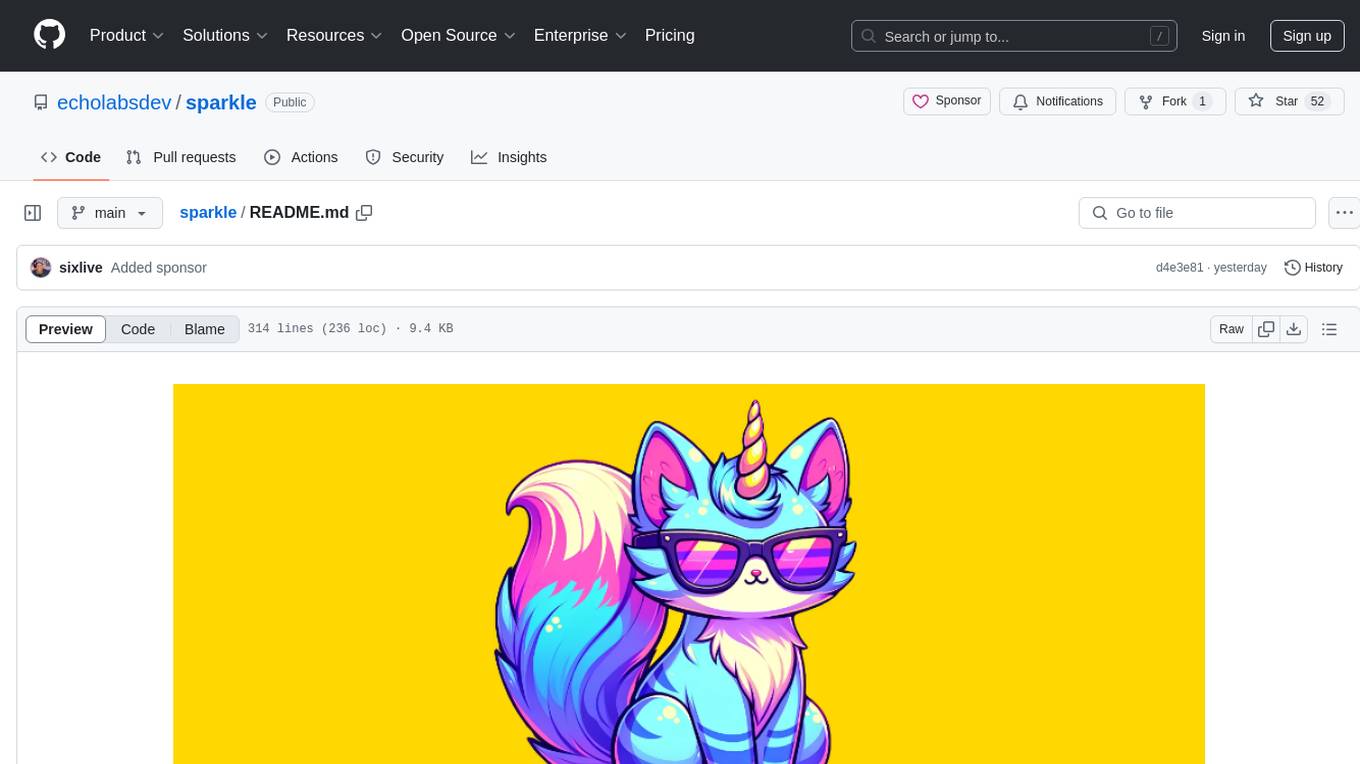
Sparkle is a tool that streamlines the process of building AI-driven features in applications using Large Language Models (LLMs). It guides users through creating and managing agents, defining tools, and interacting with LLM providers like OpenAI. Sparkle allows customization of LLM provider settings, model configurations, and provides a seamless integration with Sparkle Server for exposing agents via an OpenAI-compatible chat API endpoint.
README:
Sparkle provides a streamlined way to build AI-driven features in your application using Large Language Models (LLMs). This guide will walk you through creating and managing agents, defining tools, and interacting with various LLM providers, such as OpenAI.
Before you begin, ensure you have installed the necessary packages and configured your application to use Sparkle.
You can install Sparkle via Composer:
composer require echolabs/sparkleAfter installation, you can publish the configuration file:
php artisan vendor:publish --provider="EchoLabs\Sparkle\SparkleServiceProvider"This will create a config/sparkle.php file where you can configure your default LLM provider, model, and other settings. The provider also automatically registers the routes for Sparkle Server.
The configuration file allows you to set your default LLM provider and model:
return [
'providers' => [
'openai' => [
'api_key' => env('OPENAI_API_KEY'),
],
],
];Make sure to set the necessary API keys and environment variables for your chosen provider(s).
Agents are the core of Sparkle. An agent encapsulates the logic for interacting with an LLM, including the prompt, options, and any tools it might use.
To define an agent, create a class in your App\Agents directory:
<?php
declare(strict_types=1);
namespace App\Agents;
use EchoLabs\Sparkle\Facades\Agent;
use EchoLabs\Sparkle\Facades\Tool;
class MultiToolAgent
{
public function __invoke()
{
return Agent::provider('openai')
->using('gpt-4')
->withOptions([
'top_p' => 1,
'temperature' => 0.8,
'max_tokens' => 2048,
])
->withPrompt($this->prompt())
->withTools($this->tools());
}
private function prompt(): string
{
$prompt = "MODEL ADOPTS ROLE of [PERSONA: Nyx the Cthulhu]! \r\n";
$prompt .= "Nyx is the cutest, most friendly, Cthulhu around. \r\n";
$prompt .= 'The current date and time is '.now()->toDateTimeString();
return $prompt;
}
/** @return array<int, Tool> */
public function tools(): array
{
return [
Tool::as('search')
->for('useful when you need to search for current events')
->withParameter('query', 'the search query string', 'string', true)
->using(function (string $query): string {
// simulate API request
sleep(3);
return 'The tigers game is at 3pm eastern in Detroit';
}),
Tool::as('weather')
->for('useful when you need to search for current weather conditions')
->withParameter('city', 'The city that you want the weather for', 'string', true)
->withParameter('datetime', 'the datetime for the weather conditions. format 2022-08-14 20:24:38', 'string', true)
->using(function (string $city, string $datetime): string {
// simulate API request
sleep(3);
return 'The weather will be 75° and sunny';
}),
];
}
}- Provider: The LLM provider, such as OpenAI.
- Model: The specific model, like GPT-4.
-
Options: Configuration options that modify the behavior of the LLM. (
max_tokens,temperature) - Prompt: The initial text prompt that sets the context for the model.
- Tools: Custom logic or external APIs that the agent can call.
- Memory: Memory holds the conversation history.
<?php
(new MultiToolAgent)()
->run();
// or as a stream
(new MultiToolAgent)()
->stream();Agents use the ArrayBuffer memory driver by default. You can access the underlying memory provider via $agent->memory() which allows you to add messages ex. $agent->memory()->addMessage(Message::user('Who are you?')).
<?php
use EchoLabs\Sparkle\MemoryProviders\ArrayBuffer;
$searchTool = Tool::as('search')
->for('useful when you need to search for current events')
->withParameter('query', 'the search query string', 'string', true)
->using(function (string $query): string {
// simulate API request
sleep(3);
return 'The tigers game is at 3pm eastern in Detroit';
});
$agent = Agent::provider('openai')
->using('gpt-4')
->withOptions([
'top_p' => 1,
'temperature' => 0.8,
'max_tokens' => 2048,
])
->withPrompt(view('prompts.nova'))
->withTools([$searchTool])
->withMemory(new ArrayBuffer([
Message::user('What time is the Tigers game today?'),
]));
// The tigers game is scheduled for today at 3pm in Detroit
dd($agent->run()->content);For example, if you wanted to create an Eloquent memory driver you just need to implement the MemoryProvider contract.
<?php
declare(strict_types=1);
namespace EchoLabs\Sparkle\Contracts;
use EchoLabs\Sparkle\Message;
interface MemoryProvider
{
public function addMessage(Message $message): self;
/** @param array<int, Message> $messages */
public function addMessages(array $messages): self;
/** @return array<int, Message> */
public function messages(): array;
}Tools in Sparkle represent discrete units of functionality that an agent can use. A tool could be anything from a database query to an external API call.
Tools are defined using the Tool class, allowing you to specify parameters and the logic that executes when the tool is called.
<?php
Tool::as('search')
->for('useful when you need to search for current events')
->withParameter('query', 'The search query string', 'string')
->using(function (string $query): string {
// Simulate an API call or other logic
return 'The event is at 3pm eastern';
});-
as(string $name): Sets the tool's name. -
for(string $description): Provides a description of the tool, guiding the LLM on when to use it. -
withParameter(string $name, string $description, string $type = 'string', bool $required = true): Defines a parameter for the tool. -
using(Closure|Invokeable $fn): Specifies the logic executed when the tool is invoked.
Sparkle Server provides an easy way to expose your agents via an OpenAI-compatible chat API endpoint, supporting both streaming and non-streaming responses. This feature allows seamless integration with tools like Open Web UI or other platforms that expect an OpenAI-like API for interacting with LLMs.
To get started with Sparkle Server, you'll need to register your agents within your application. This is typically done within a service provider.
Agents are registered with the SparkleServer facade in a service provider. Here's an example of how to register an agent:
<?php
namespace App\Providers;
use App\Agents\MultiToolAgent;
use EchoLabs\Sparkle\Facades\SparkleServer;
use Illuminate\Support\ServiceProvider;
class AppServiceProvider extends ServiceProvider
{
public function register(): void
{
SparkleServer::register(
'agent-with-tools',
new MultiToolAgent
);
}
}In this example, we're registering an agent called agent-with-tools using the MultiToolAgent class. The name provided will be used as the model identifier when making API requests.
Once your agents are registered, you can interact with them through a Sparkle Server endpoint. The server is compatible with the OpenAI chat completion API, making it easy to integrate with existing tools and workflows. My personal favorite tool for this is Open WebUI.
To send a message to an agent, you can use a POST request to the /sparkle/openai/v1/chat/completions endpoint. Below is an example of such a request:
curl -X "POST" "http://localhost:8001/sparkle/openai/v1/chat/completions" \
-H 'Accept: application/json' \
-H 'Content-Type: application/json; charset=utf-8' \
-d $'{
"model": "agent-with-tools",
"stream": false,
"messages": [
{
"content": "What time is the Tigers game today? Do I need a coat?",
"role": "user"
}
]
}'The server will respond with a JSON object containing the assistant's message, similar to the OpenAI API response format:
{
"id": "01J6APGE5YS8S04NN7N8REPPR6",
"object": "chat.completion",
"created": 1724788521,
"model": "agent-with-tools",
"usage": [],
"choices": [
{
"index": 0,
"delta": {
"role": "assistant",
"content": "The Tigers game is today at 3pm Eastern in Detroit. The weather will be 75° and sunny, so you shouldn't need a coat."
},
"finish_reason": "stop"
}
]
}For applications that require real-time data, Sparkle Server also supports streaming responses. Here's how you would make a request that streams the response:
curl -X "POST" "http://localhost:8001/sparkle/openai/v1/chat/completions" \
-H 'Accept: application/json' \
-H 'Content-Type: application/json; charset=utf-8' \
-d $'{
"model": "agent-with-tools",
"stream": true,
"messages": [
{
"content": "What time is the Tigers game today? Do I need a coat?",
"role": "user"
}
]
}'The server will stream back the response in chunks, allowing you to process the response as it's generated:
data: {"object":"chat.completion.chunk","model":"gpt-4","choices":[{"delta":{"role":"assistant","content":"The"}}]}
data: {"object":"chat.completion.chunk","model":"gpt-4","choices":[{"delta":{"role":"assistant","content":" Tigers"}}]}
data: {"object":"chat.completion.chunk","model":"gpt-4","choices":[{"delta":{"role":"assistant","content":" game"}}]}
...
data: {"object":"chat.completion.chunk","model":"gpt-4","choices":[{"delta":{"role":"assistant","content":"."}}]}
data: [DONE]
To list all the agents registered with Sparkle Server, you can send a GET request to the /sparkle/openai/v1/models endpoint:
curl "http://localhost:8001/sparkle/openai/v1/models" \
-H 'Accept: application/json' \
-H 'Content-Type: application/json; charset=utf-8'The server will return a list of all registered agents:
{
"object": "list",
"data": [
{
"id": "agent-with-tools",
"object": "model"
}
]
}For Tasks:
Click tags to check more tools for each tasksFor Jobs:
Alternative AI tools for sparkle
Similar Open Source Tools

sparkle
Sparkle is a tool that streamlines the process of building AI-driven features in applications using Large Language Models (LLMs). It guides users through creating and managing agents, defining tools, and interacting with LLM providers like OpenAI. Sparkle allows customization of LLM provider settings, model configurations, and provides a seamless integration with Sparkle Server for exposing agents via an OpenAI-compatible chat API endpoint.

instructor
Instructor is a popular Python library for managing structured outputs from large language models (LLMs). It offers a user-friendly API for validation, retries, and streaming responses. With support for various LLM providers and multiple languages, Instructor simplifies working with LLM outputs. The library includes features like response models, retry management, validation, streaming support, and flexible backends. It also provides hooks for logging and monitoring LLM interactions, and supports integration with Anthropic, Cohere, Gemini, Litellm, and Google AI models. Instructor facilitates tasks such as extracting user data from natural language, creating fine-tuned models, managing uploaded files, and monitoring usage of OpenAI models.
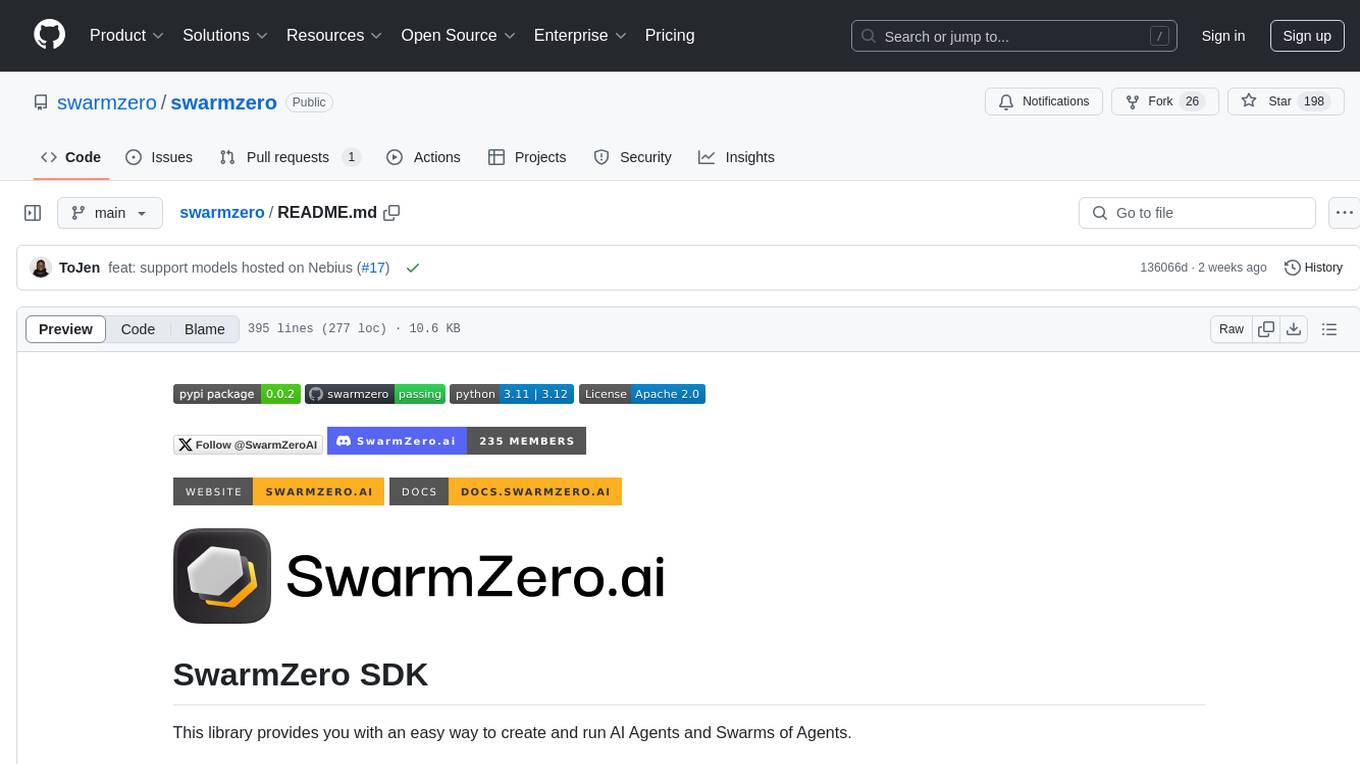
swarmzero
SwarmZero SDK is a library that simplifies the creation and execution of AI Agents and Swarms of Agents. It supports various LLM Providers such as OpenAI, Azure OpenAI, Anthropic, MistralAI, Gemini, Nebius, and Ollama. Users can easily install the library using pip or poetry, set up the environment and configuration, create and run Agents, collaborate with Swarms, add tools for complex tasks, and utilize retriever tools for semantic information retrieval. Sample prompts are provided to help users explore the capabilities of the agents and swarms. The SDK also includes detailed examples and documentation for reference.
aiavatarkit
AIAvatarKit is a tool for building AI-based conversational avatars quickly. It supports various platforms like VRChat and cluster, along with real-world devices. The tool is extensible, allowing unlimited capabilities based on user needs. It requires VOICEVOX API, Google or Azure Speech Services API keys, and Python 3.10. Users can start conversations out of the box and enjoy seamless interactions with the avatars.
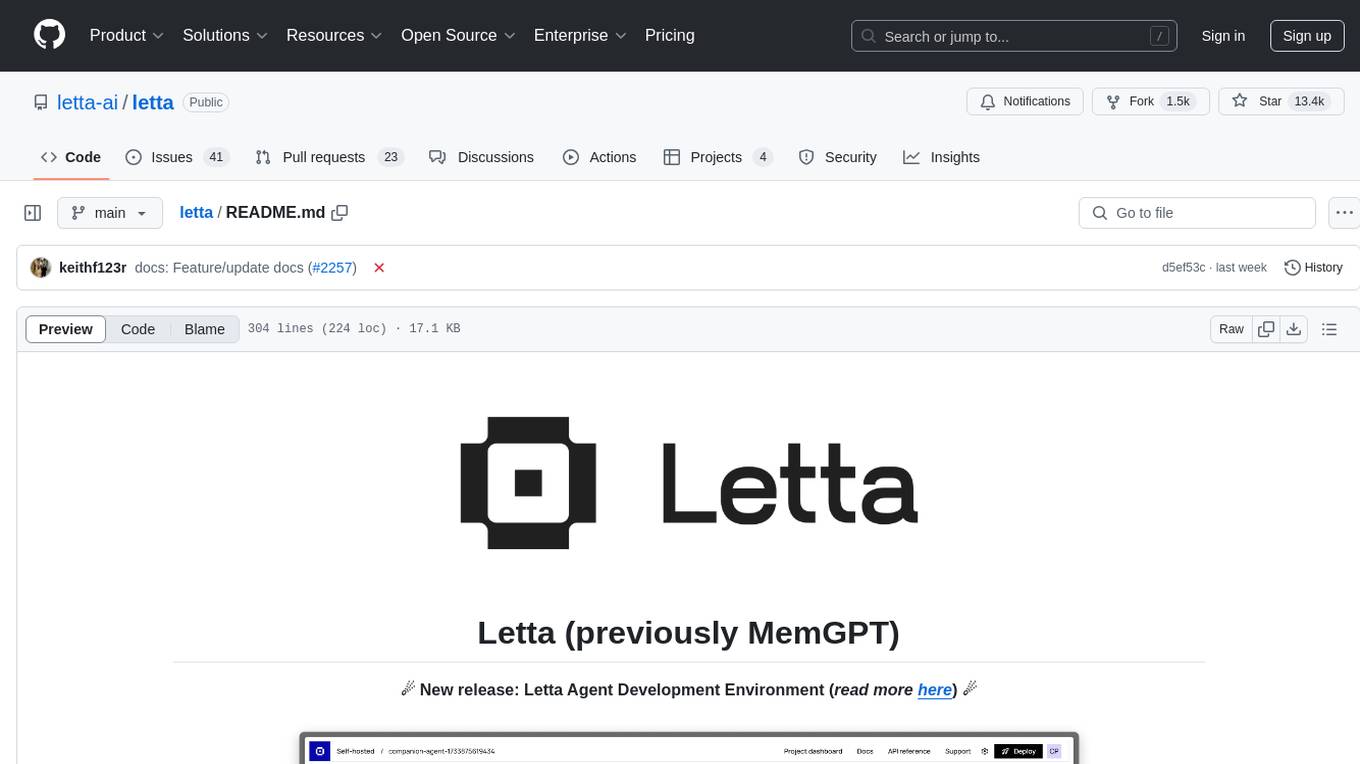
letta
Letta is an open source framework for building stateful LLM applications. It allows users to build stateful agents with advanced reasoning capabilities and transparent long-term memory. The framework is white box and model-agnostic, enabling users to connect to various LLM API backends. Letta provides a graphical interface, the Letta ADE, for creating, deploying, interacting, and observing with agents. Users can access Letta via REST API, Python, Typescript SDKs, and the ADE. Letta supports persistence by storing agent data in a database, with PostgreSQL recommended for data migrations. Users can install Letta using Docker or pip, with Docker defaulting to PostgreSQL and pip defaulting to SQLite. Letta also offers a CLI tool for interacting with agents. The project is open source and welcomes contributions from the community.
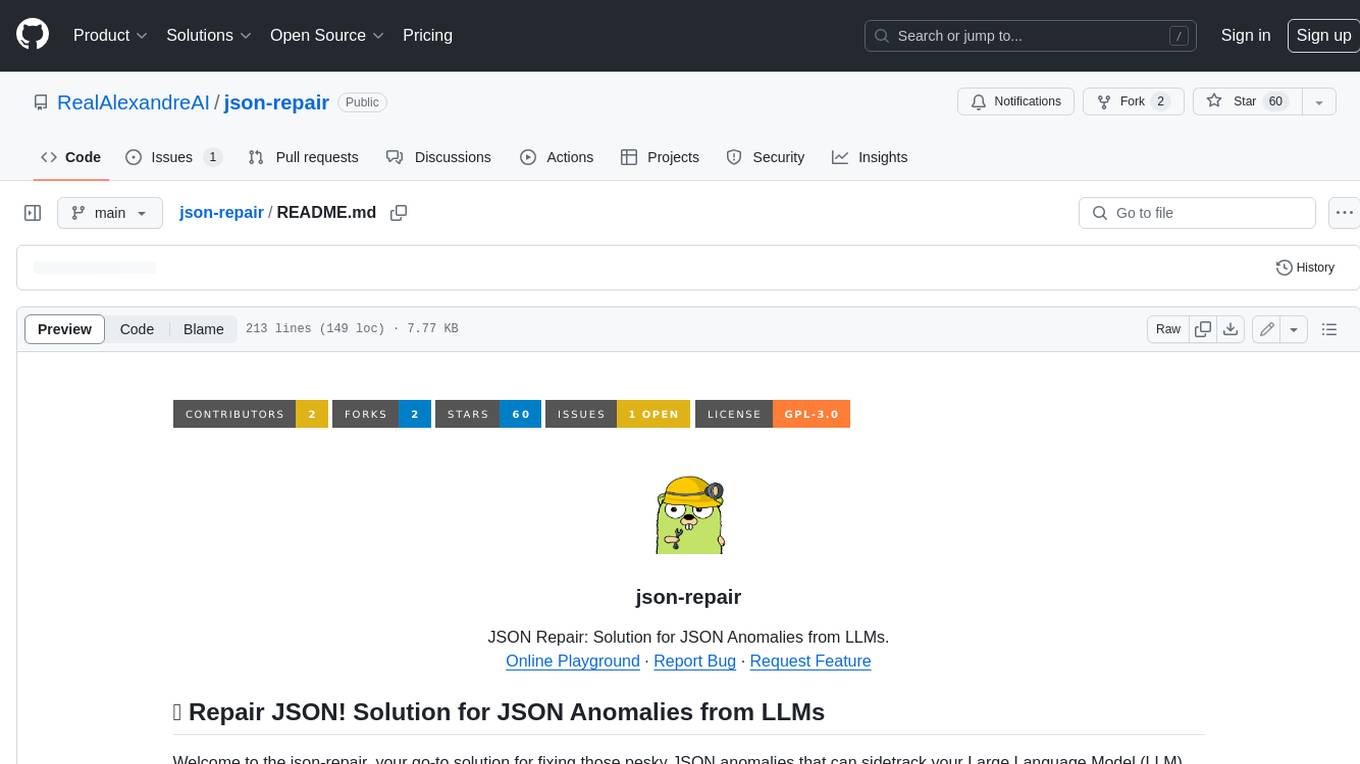
json-repair
JSON Repair is a toolkit designed to address JSON anomalies that can arise from Large Language Models (LLMs). It offers a comprehensive solution for repairing JSON strings, ensuring accuracy and reliability in your data processing. With its user-friendly interface and extensive capabilities, JSON Repair empowers developers to seamlessly integrate JSON repair into their workflows.
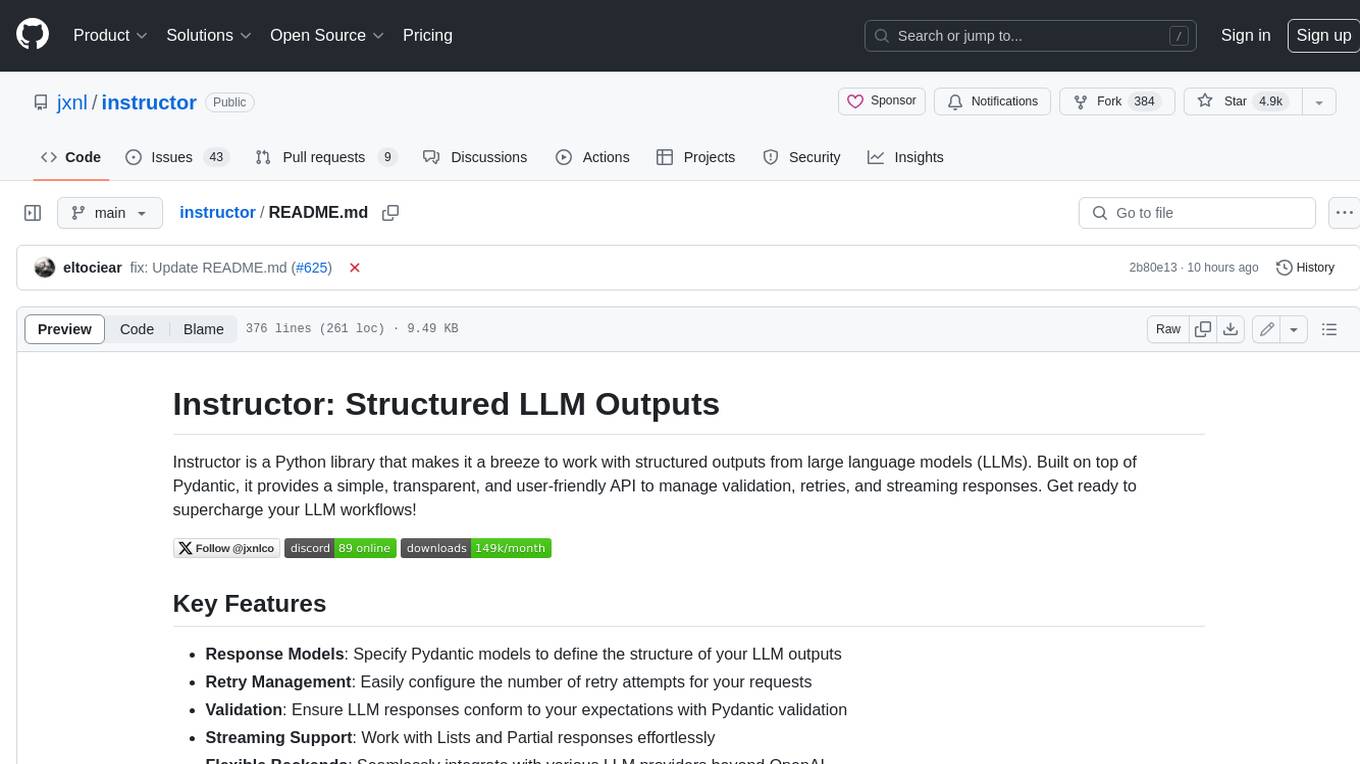
instructor
Instructor is a Python library that makes it a breeze to work with structured outputs from large language models (LLMs). Built on top of Pydantic, it provides a simple, transparent, and user-friendly API to manage validation, retries, and streaming responses. Get ready to supercharge your LLM workflows!
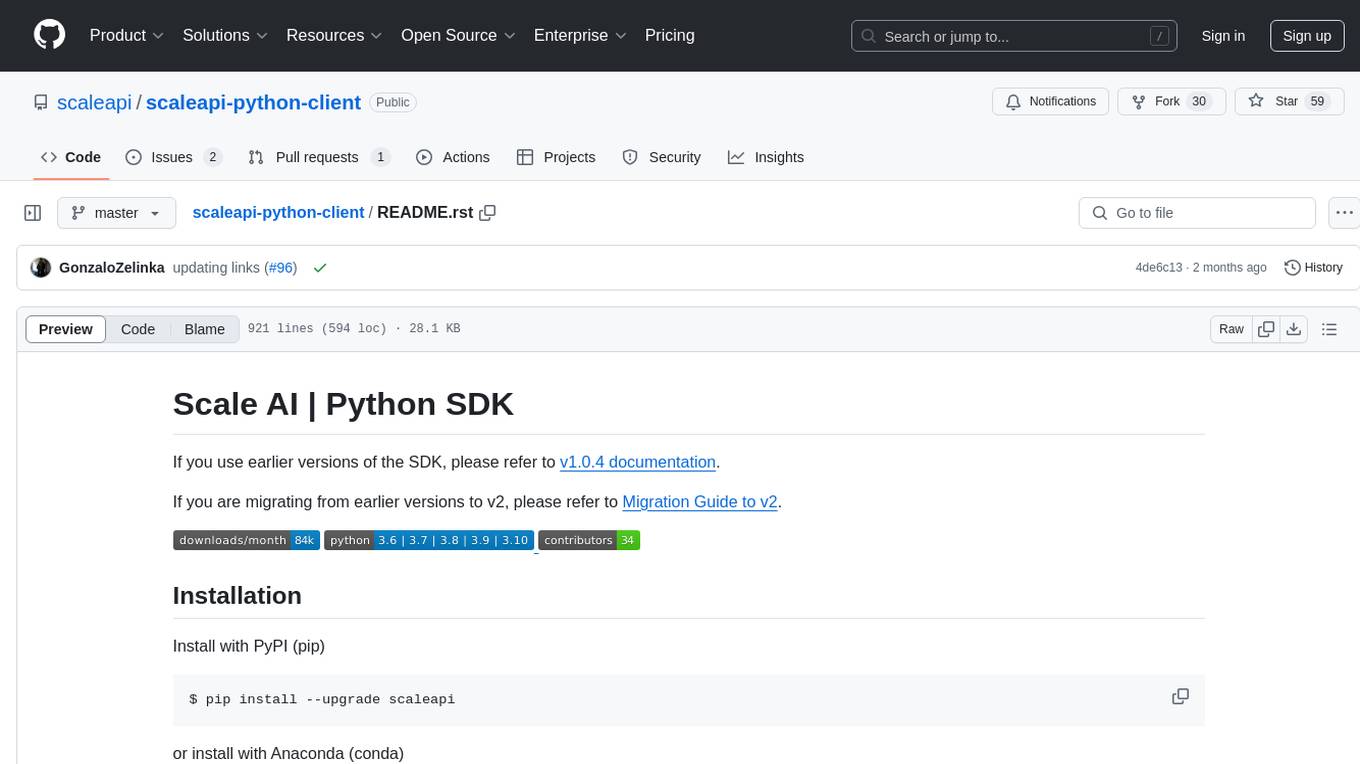
scaleapi-python-client
The Scale AI Python SDK is a tool that provides a Python interface for interacting with the Scale API. It allows users to easily create tasks, manage projects, upload files, and work with evaluation tasks, training tasks, and Studio assignments. The SDK handles error handling and provides detailed documentation for each method. Users can also manage teammates, project groups, and batches within the Scale Studio environment. The SDK supports various functionalities such as creating tasks, retrieving tasks, canceling tasks, auditing tasks, updating task attributes, managing files, managing team members, and working with evaluation and training tasks.
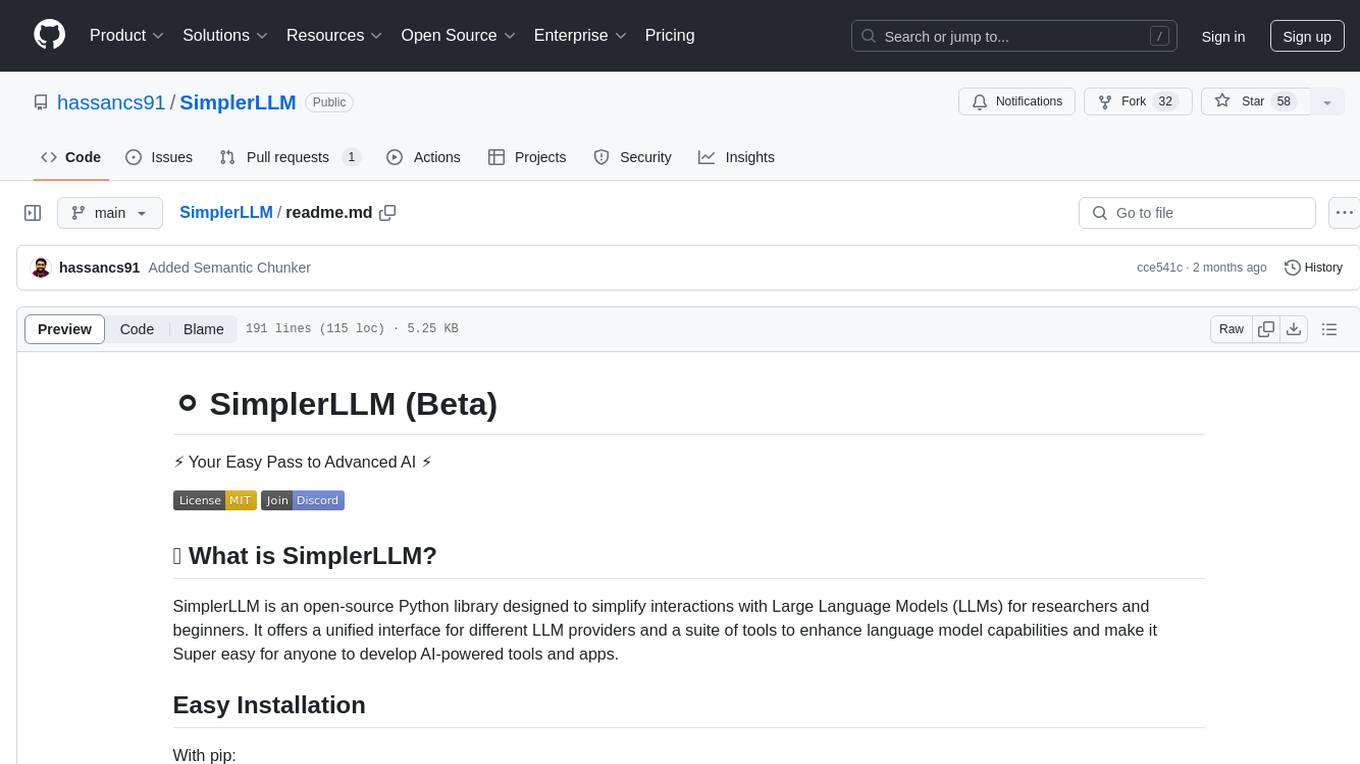
SimplerLLM
SimplerLLM is an open-source Python library that simplifies interactions with Large Language Models (LLMs) for researchers and beginners. It provides a unified interface for different LLM providers, tools for enhancing language model capabilities, and easy development of AI-powered tools and apps. The library offers features like unified LLM interface, generic text loader, RapidAPI connector, SERP integration, prompt template builder, and more. Users can easily set up environment variables, create LLM instances, use tools like SERP, generic text loader, calling RapidAPI APIs, and prompt template builder. Additionally, the library includes chunking functions to split texts into manageable chunks based on different criteria. Future updates will bring more tools, interactions with local LLMs, prompt optimization, response evaluation, GPT Trainer, document chunker, advanced document loader, integration with more providers, Simple RAG with SimplerVectors, integration with vector databases, agent builder, and LLM server.
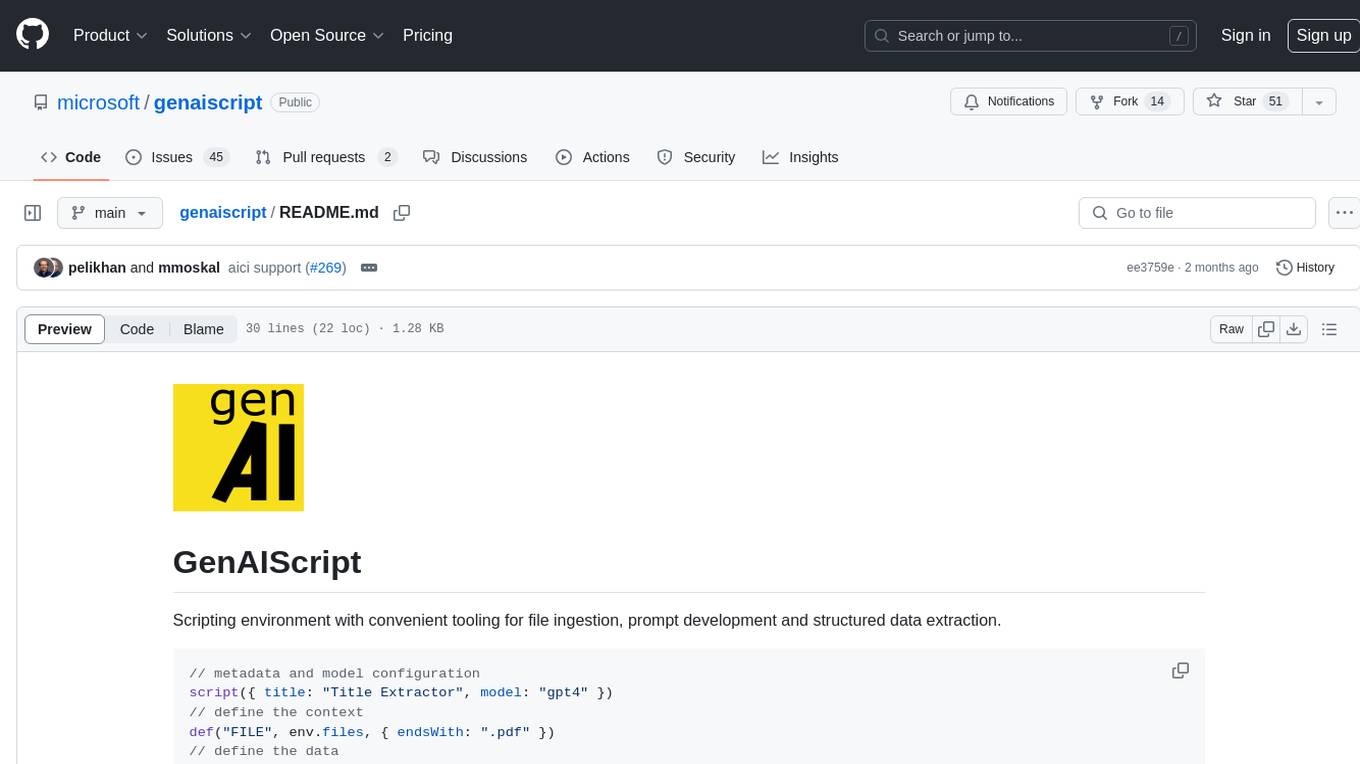
genaiscript
GenAIScript is a scripting environment designed to facilitate file ingestion, prompt development, and structured data extraction. Users can define metadata and model configurations, specify data sources, and define tasks to extract specific information. The tool provides a convenient way to analyze files and extract desired content in a structured format. It offers a user-friendly interface for working with data and automating data extraction processes, making it suitable for various data processing tasks.
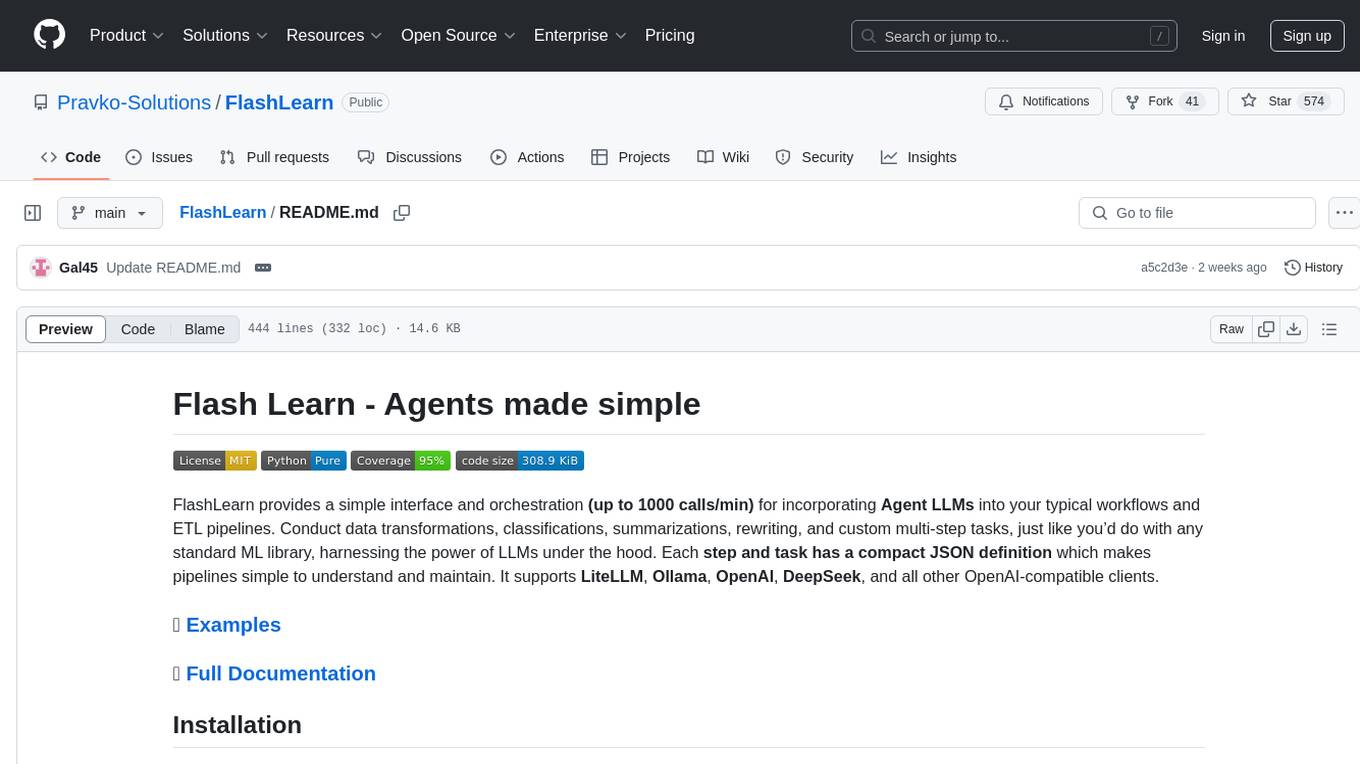
FlashLearn
FlashLearn is a tool that provides a simple interface and orchestration for incorporating Agent LLMs into workflows and ETL pipelines. It allows data transformations, classifications, summarizations, rewriting, and custom multi-step tasks using LLMs. Each step and task has a compact JSON definition, making pipelines easy to understand and maintain. FlashLearn supports LiteLLM, Ollama, OpenAI, DeepSeek, and other OpenAI-compatible clients.
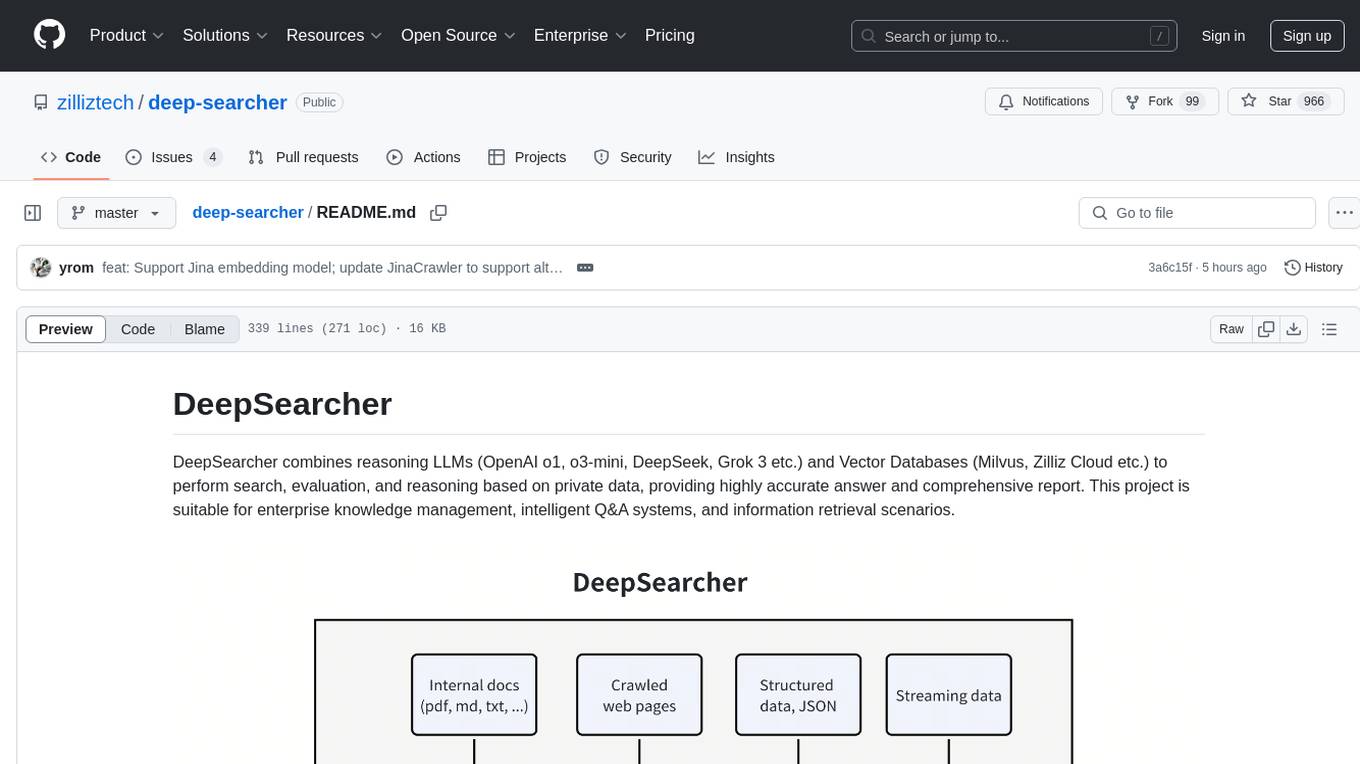
deep-searcher
DeepSearcher is a tool that combines reasoning LLMs and Vector Databases to perform search, evaluation, and reasoning based on private data. It is suitable for enterprise knowledge management, intelligent Q&A systems, and information retrieval scenarios. The tool maximizes the utilization of enterprise internal data while ensuring data security, supports multiple embedding models, and provides support for multiple LLMs for intelligent Q&A and content generation. It also includes features like private data search, vector database management, and document loading with web crawling capabilities under development.
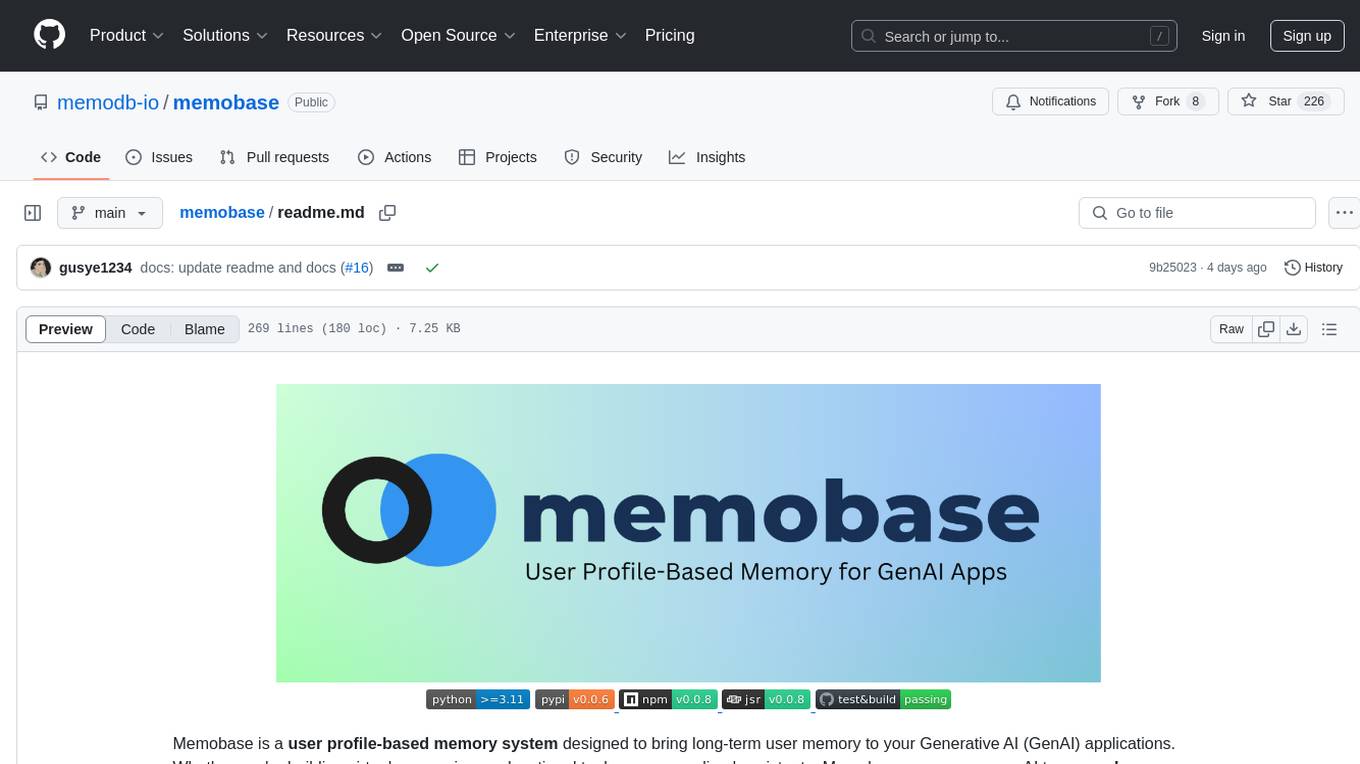
memobase
Memobase is a user profile-based memory system designed to enhance Generative AI applications by enabling them to remember, understand, and evolve with users. It provides structured user profiles, scalable profiling, easy integration with existing LLM stacks, batch processing for speed, and is production-ready. Users can manage users, insert data, get memory profiles, and track user preferences and behaviors. Memobase is ideal for applications that require user analysis, tracking, and personalized interactions.
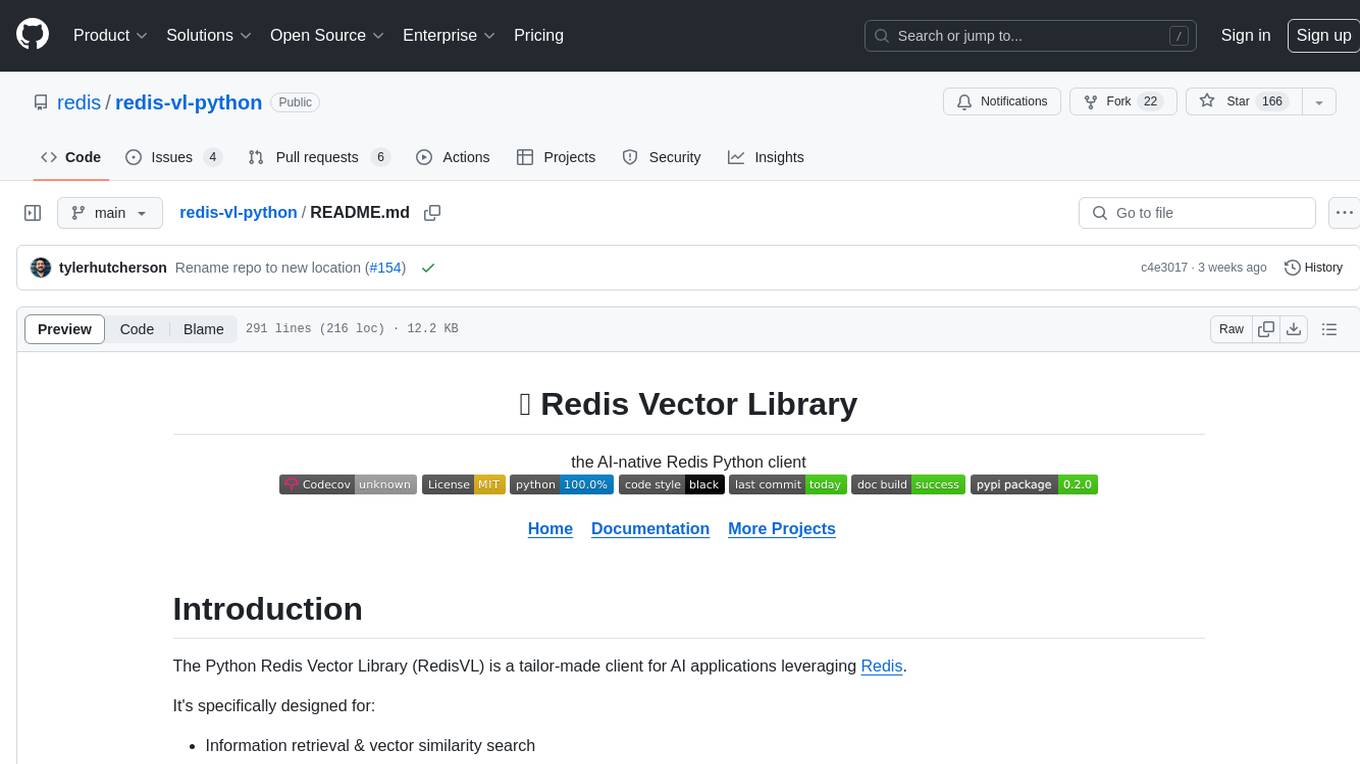
redis-vl-python
The Python Redis Vector Library (RedisVL) is a tailor-made client for AI applications leveraging Redis. It enhances applications with Redis' speed, flexibility, and reliability, incorporating capabilities like vector-based semantic search, full-text search, and geo-spatial search. The library bridges the gap between the emerging AI-native developer ecosystem and the capabilities of Redis by providing a lightweight, elegant, and intuitive interface. It abstracts the features of Redis into a grammar that is more aligned to the needs of today's AI/ML Engineers or Data Scientists.
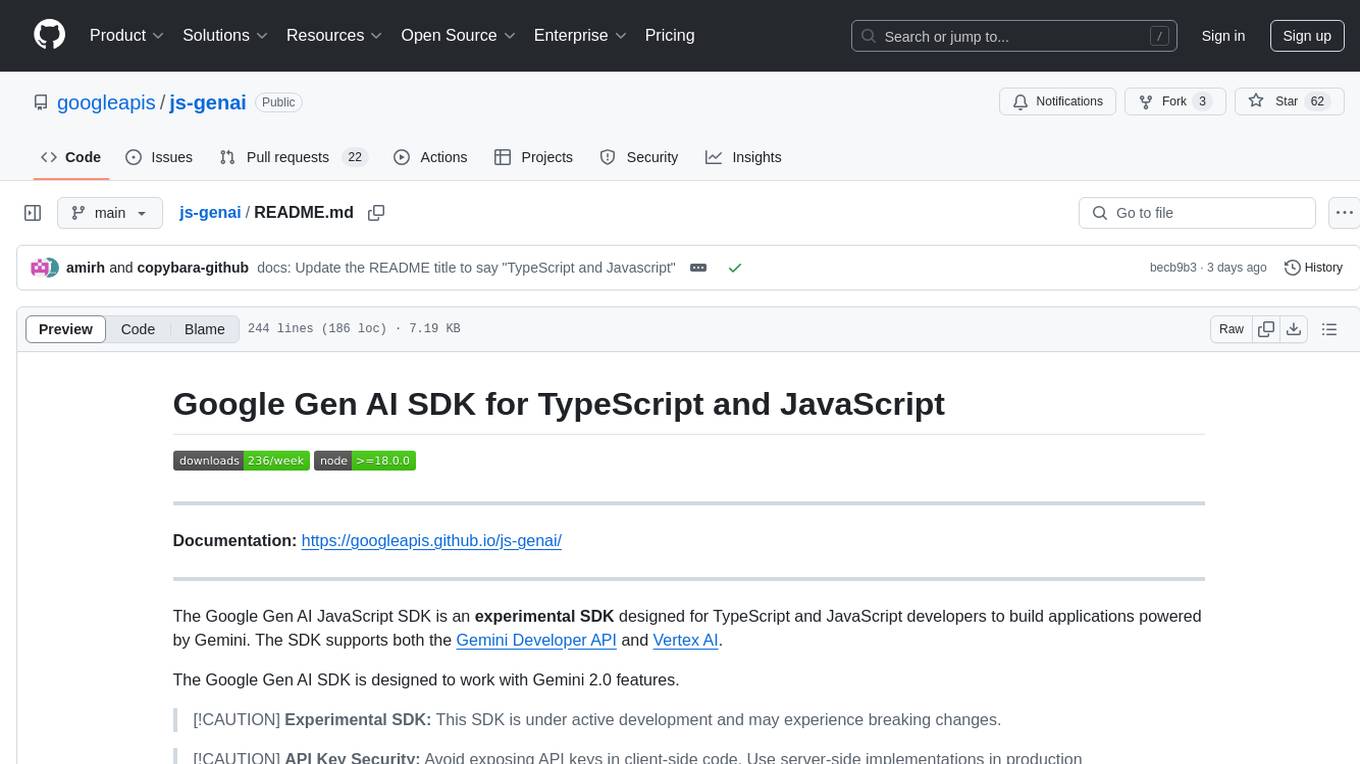
js-genai
The Google Gen AI JavaScript SDK is an experimental SDK for TypeScript and JavaScript developers to build applications powered by Gemini. It supports both the Gemini Developer API and Vertex AI. The SDK is designed to work with Gemini 2.0 features. Users can access API features through the GoogleGenAI classes, which provide submodules for querying models, managing caches, creating chats, uploading files, and starting live sessions. The SDK also allows for function calling to interact with external systems. Users can find more samples in the GitHub samples directory.
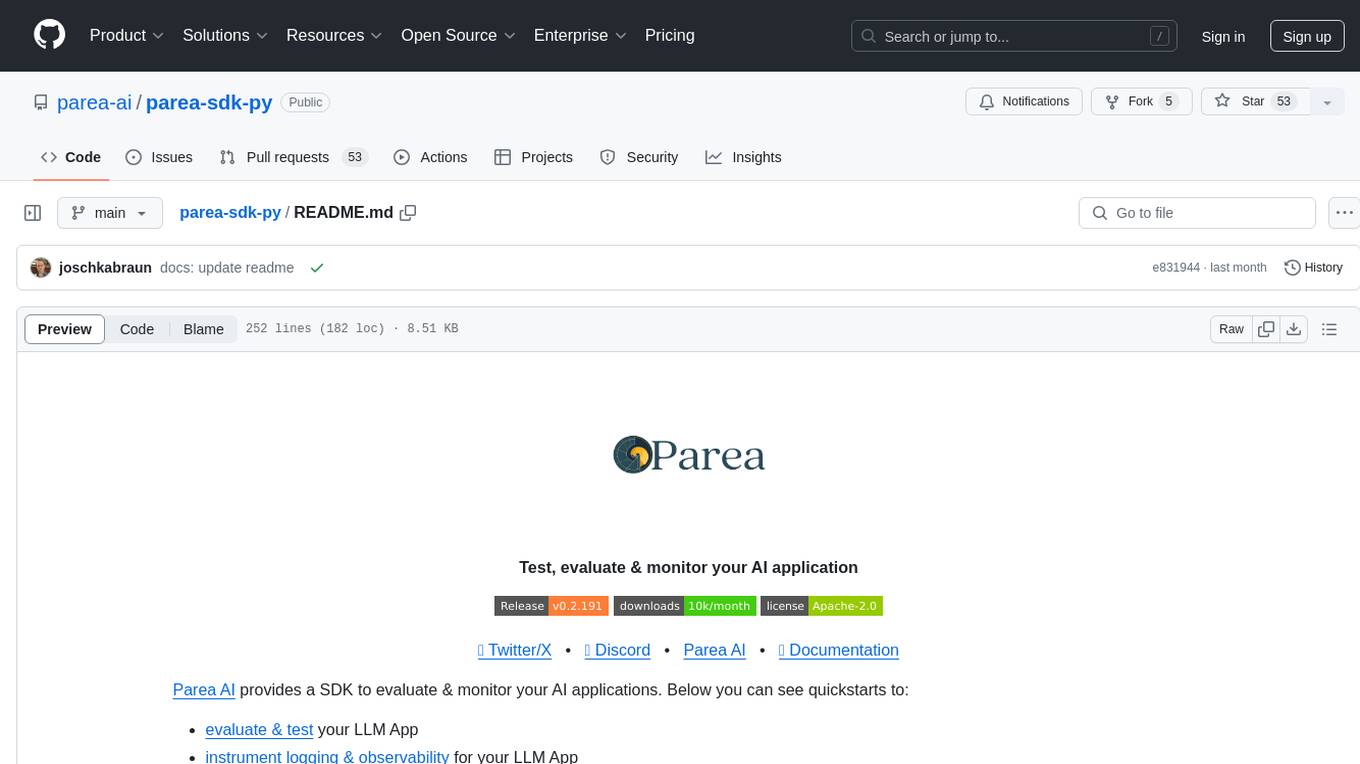
parea-sdk-py
Parea AI provides a SDK to evaluate & monitor AI applications. It allows users to test, evaluate, and monitor their AI models by defining and running experiments. The SDK also enables logging and observability for AI applications, as well as deploying prompts to facilitate collaboration between engineers and subject-matter experts. Users can automatically log calls to OpenAI and Anthropic, create hierarchical traces of their applications, and deploy prompts for integration into their applications.
For similar tasks

Flowise
Flowise is a tool that allows users to build customized LLM flows with a drag-and-drop UI. It is open-source and self-hostable, and it supports various deployments, including AWS, Azure, Digital Ocean, GCP, Railway, Render, HuggingFace Spaces, Elestio, Sealos, and RepoCloud. Flowise has three different modules in a single mono repository: server, ui, and components. The server module is a Node backend that serves API logics, the ui module is a React frontend, and the components module contains third-party node integrations. Flowise supports different environment variables to configure your instance, and you can specify these variables in the .env file inside the packages/server folder.

nlux
nlux is an open-source Javascript and React JS library that makes it super simple to integrate powerful large language models (LLMs) like ChatGPT into your web app or website. With just a few lines of code, you can add conversational AI capabilities and interact with your favourite LLM.
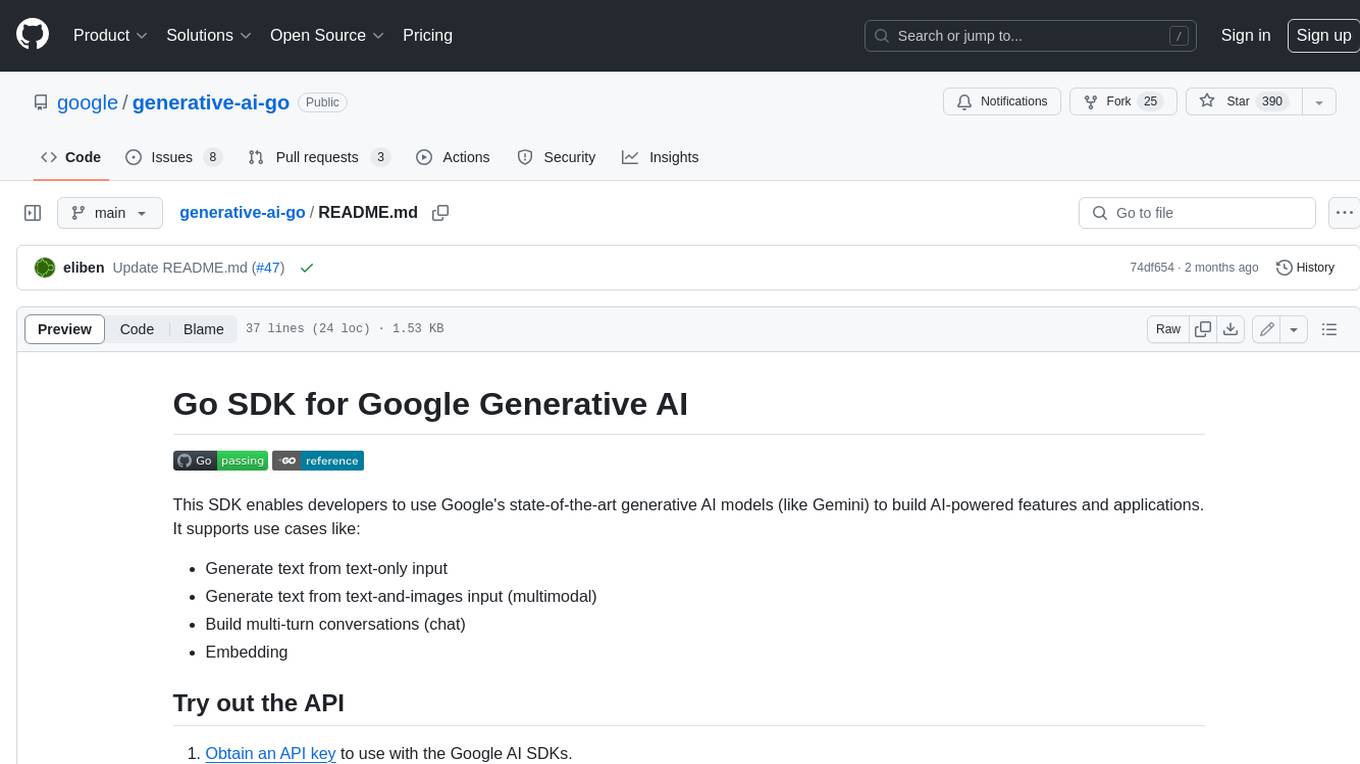
generative-ai-go
The Google AI Go SDK enables developers to use Google's state-of-the-art generative AI models (like Gemini) to build AI-powered features and applications. It supports use cases like generating text from text-only input, generating text from text-and-images input (multimodal), building multi-turn conversations (chat), and embedding.
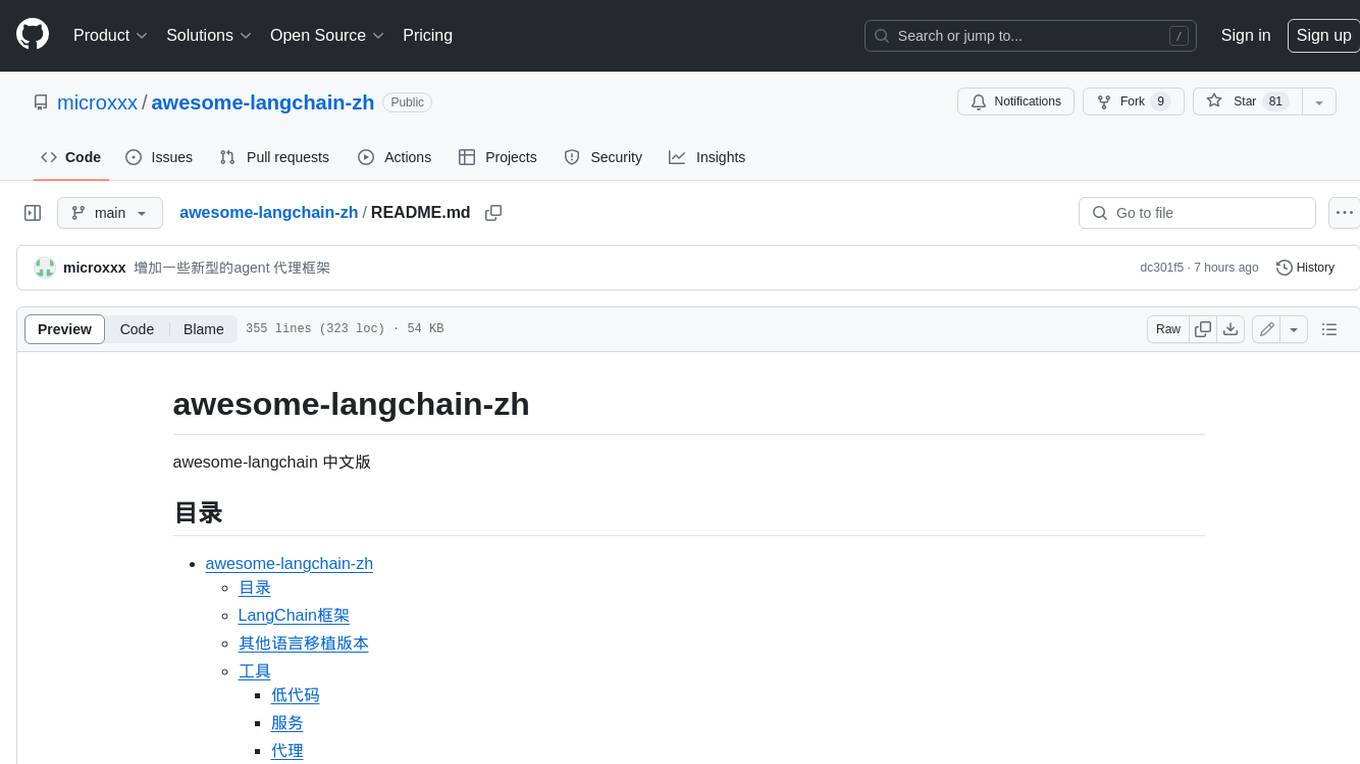
awesome-langchain-zh
The awesome-langchain-zh repository is a collection of resources related to LangChain, a framework for building AI applications using large language models (LLMs). The repository includes sections on the LangChain framework itself, other language ports of LangChain, tools for low-code development, services, agents, templates, platforms, open-source projects related to knowledge management and chatbots, as well as learning resources such as notebooks, videos, and articles. It also covers other LLM frameworks and provides additional resources for exploring and working with LLMs. The repository serves as a comprehensive guide for developers and AI enthusiasts interested in leveraging LangChain and LLMs for various applications.
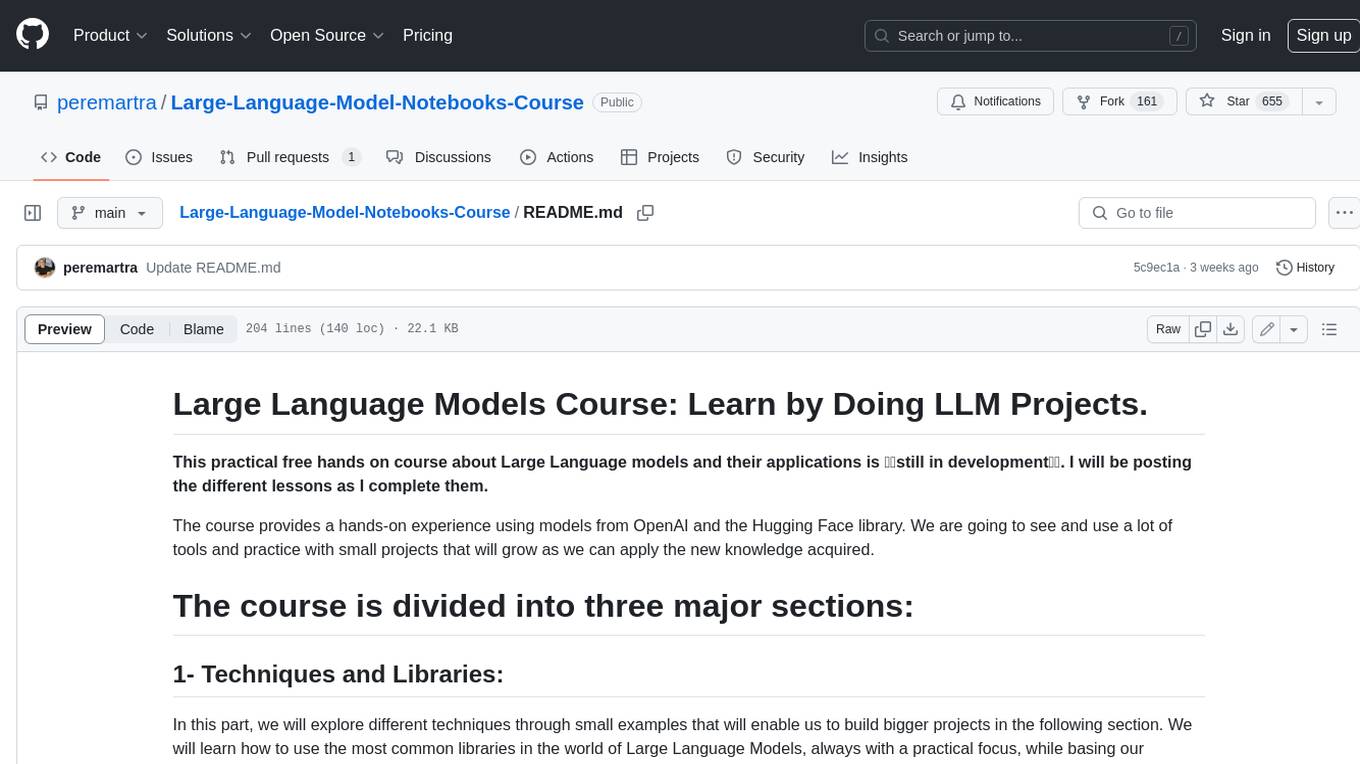
Large-Language-Model-Notebooks-Course
This practical free hands-on course focuses on Large Language models and their applications, providing a hands-on experience using models from OpenAI and the Hugging Face library. The course is divided into three major sections: Techniques and Libraries, Projects, and Enterprise Solutions. It covers topics such as Chatbots, Code Generation, Vector databases, LangChain, Fine Tuning, PEFT Fine Tuning, Soft Prompt tuning, LoRA, QLoRA, Evaluate Models, Knowledge Distillation, and more. Each section contains chapters with lessons supported by notebooks and articles. The course aims to help users build projects and explore enterprise solutions using Large Language Models.
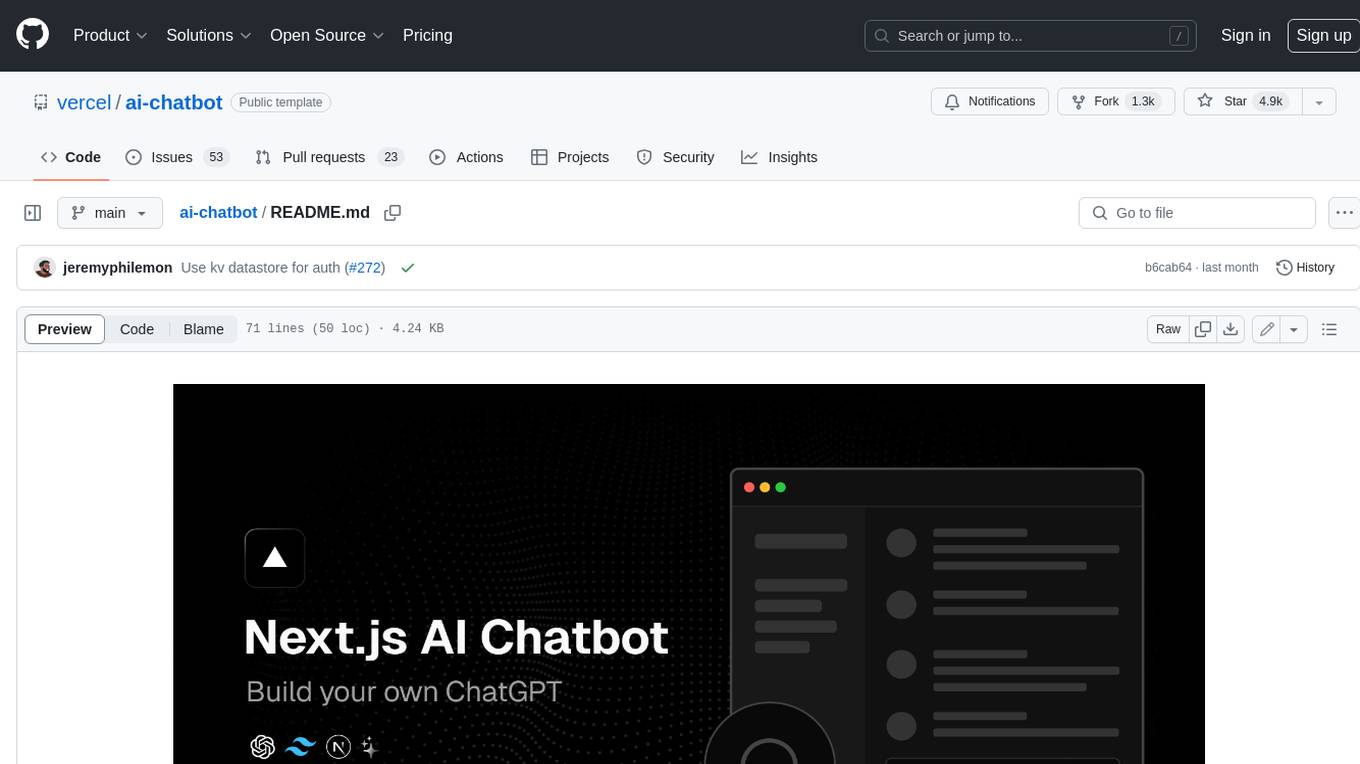
ai-chatbot
Next.js AI Chatbot is an open-source app template for building AI chatbots using Next.js, Vercel AI SDK, OpenAI, and Vercel KV. It includes features like Next.js App Router, React Server Components, Vercel AI SDK for streaming chat UI, support for various AI models, Tailwind CSS styling, Radix UI for headless components, chat history management, rate limiting, session storage with Vercel KV, and authentication with NextAuth.js. The template allows easy deployment to Vercel and customization of AI model providers.
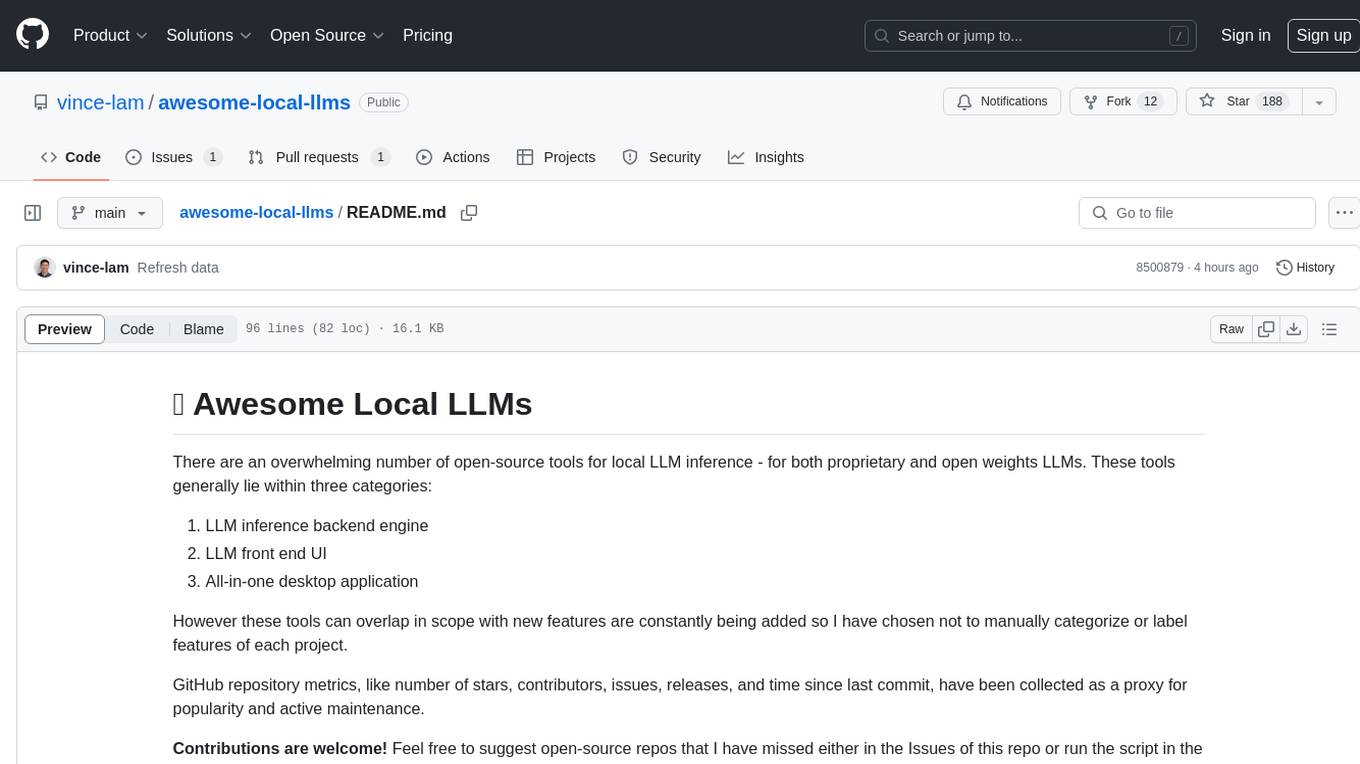
awesome-local-llms
The 'awesome-local-llms' repository is a curated list of open-source tools for local Large Language Model (LLM) inference, covering both proprietary and open weights LLMs. The repository categorizes these tools into LLM inference backend engines, LLM front end UIs, and all-in-one desktop applications. It collects GitHub repository metrics as proxies for popularity and active maintenance. Contributions are encouraged, and users can suggest additional open-source repositories through the Issues section or by running a provided script to update the README and make a pull request. The repository aims to provide a comprehensive resource for exploring and utilizing local LLM tools.
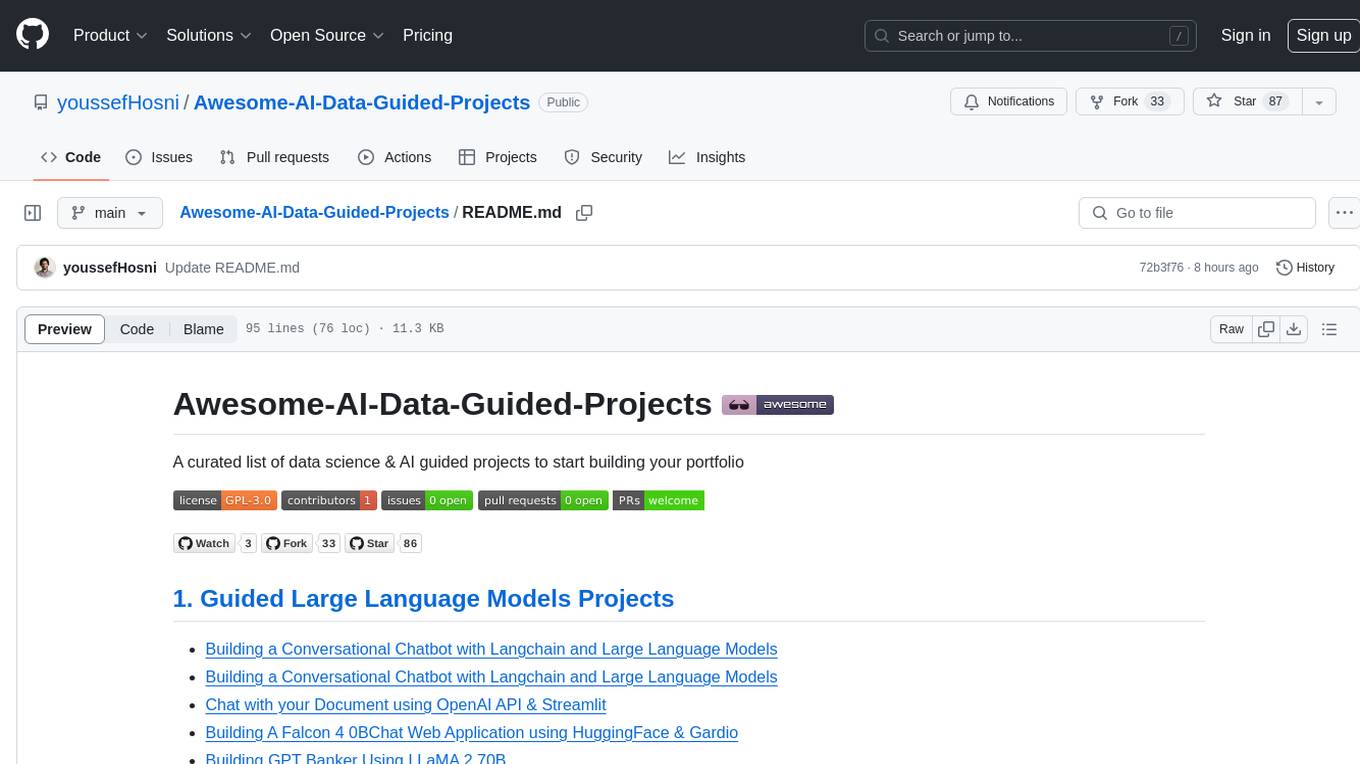
Awesome-AI-Data-Guided-Projects
A curated list of data science & AI guided projects to start building your portfolio. The repository contains guided projects covering various topics such as large language models, time series analysis, computer vision, natural language processing (NLP), and data science. Each project provides detailed instructions on how to implement specific tasks using different tools and technologies.
For similar jobs

sweep
Sweep is an AI junior developer that turns bugs and feature requests into code changes. It automatically handles developer experience improvements like adding type hints and improving test coverage.

teams-ai
The Teams AI Library is a software development kit (SDK) that helps developers create bots that can interact with Teams and Microsoft 365 applications. It is built on top of the Bot Framework SDK and simplifies the process of developing bots that interact with Teams' artificial intelligence capabilities. The SDK is available for JavaScript/TypeScript, .NET, and Python.

ai-guide
This guide is dedicated to Large Language Models (LLMs) that you can run on your home computer. It assumes your PC is a lower-end, non-gaming setup.

classifai
Supercharge WordPress Content Workflows and Engagement with Artificial Intelligence. Tap into leading cloud-based services like OpenAI, Microsoft Azure AI, Google Gemini and IBM Watson to augment your WordPress-powered websites. Publish content faster while improving SEO performance and increasing audience engagement. ClassifAI integrates Artificial Intelligence and Machine Learning technologies to lighten your workload and eliminate tedious tasks, giving you more time to create original content that matters.

chatbot-ui
Chatbot UI is an open-source AI chat app that allows users to create and deploy their own AI chatbots. It is easy to use and can be customized to fit any need. Chatbot UI is perfect for businesses, developers, and anyone who wants to create a chatbot.

BricksLLM
BricksLLM is a cloud native AI gateway written in Go. Currently, it provides native support for OpenAI, Anthropic, Azure OpenAI and vLLM. BricksLLM aims to provide enterprise level infrastructure that can power any LLM production use cases. Here are some use cases for BricksLLM: * Set LLM usage limits for users on different pricing tiers * Track LLM usage on a per user and per organization basis * Block or redact requests containing PIIs * Improve LLM reliability with failovers, retries and caching * Distribute API keys with rate limits and cost limits for internal development/production use cases * Distribute API keys with rate limits and cost limits for students

uAgents
uAgents is a Python library developed by Fetch.ai that allows for the creation of autonomous AI agents. These agents can perform various tasks on a schedule or take action on various events. uAgents are easy to create and manage, and they are connected to a fast-growing network of other uAgents. They are also secure, with cryptographically secured messages and wallets.

griptape
Griptape is a modular Python framework for building AI-powered applications that securely connect to your enterprise data and APIs. It offers developers the ability to maintain control and flexibility at every step. Griptape's core components include Structures (Agents, Pipelines, and Workflows), Tasks, Tools, Memory (Conversation Memory, Task Memory, and Meta Memory), Drivers (Prompt and Embedding Drivers, Vector Store Drivers, Image Generation Drivers, Image Query Drivers, SQL Drivers, Web Scraper Drivers, and Conversation Memory Drivers), Engines (Query Engines, Extraction Engines, Summary Engines, Image Generation Engines, and Image Query Engines), and additional components (Rulesets, Loaders, Artifacts, Chunkers, and Tokenizers). Griptape enables developers to create AI-powered applications with ease and efficiency.

